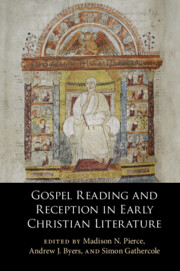Book contents
- Gospel Reading and Reception in Early Christian Literature
- Gospel Reading and Reception in Early Christian Literature
- Copyright page
- Dedication
- Contents
- Contributors
- Foreword: We Are All Gospel Readers
- Introduction
- Part I Reading the Gospel in Israel’s Scriptures
- 1 Reading the Old Testament Christologically
- 2 Where Is the “God of Israel” in Paul’s Reading of the Gospel?
- 3 Gospel Reading and Prosopological Exegesis in Luke-Acts
- Part II Gospel Writers as Gospel Readers
- Part III Gospel Reading as Ecclesial Tradition
- Bibliography
- Index of Ancient Sources
- Index of Modern Authors
- Index of Subjects
2 - Where Is the “God of Israel” in Paul’s Reading of the Gospel?
from Part I - Reading the Gospel in Israel’s Scriptures
Published online by Cambridge University Press: 27 January 2022
- Gospel Reading and Reception in Early Christian Literature
- Gospel Reading and Reception in Early Christian Literature
- Copyright page
- Dedication
- Contents
- Contributors
- Foreword: We Are All Gospel Readers
- Introduction
- Part I Reading the Gospel in Israel’s Scriptures
- 1 Reading the Old Testament Christologically
- 2 Where Is the “God of Israel” in Paul’s Reading of the Gospel?
- 3 Gospel Reading and Prosopological Exegesis in Luke-Acts
- Part II Gospel Writers as Gospel Readers
- Part III Gospel Reading as Ecclesial Tradition
- Bibliography
- Index of Ancient Sources
- Index of Modern Authors
- Index of Subjects
Summary
Perhaps the earliest canonical gospel reader was the Apostle Paul. As a Jewish interpreter of Scripture, his conception of “gospel” was informed by a Christological understanding of both “God” as the one who rescues and “Israel” as the community rescued. Understandably, one regular feature of contemporary scholarship on Paul, especially in the English-speaking world, is reference to God as the “God of Israel.” This phrase becomes a shorthand for the commendable conviction that Paul needs to be understood within his own Jewish identity and context – shaped by his engagement with Scripture. It comes as a surprise to recognize, however, that Paul himself never uses the phrase “God of Israel” (or any of its equivalents, such as “God of Abraham,” “God of our fathers”). In Romans 3:29, he comes close, only to reject the identification of God as “God of Jews alone.” Such nomenclature does appear in other early Jewish and Christian texts, but not in Paul. As Paul “reads” the gospel, the God who “sent his Son” and “raised Jesus our Lord from the dead” is also the God who made promises to Abraham and called Israel itself into being. Yet Paul’s “reading” does not include (intentionally or unintentionally) a naming of this figure as the “God of Israel.” That silence reflects the argument, especially in Romans, that God created Israel and sustains Israel: Israel is the “Israel of God” (a phrase Paul does use). In other words, Paul “reads” the gospel backward: it is the Christ event that reveals Israel’s history and significance.
Keywords
- Type
- Chapter
- Information
- Publisher: Cambridge University PressPrint publication year: 2022

